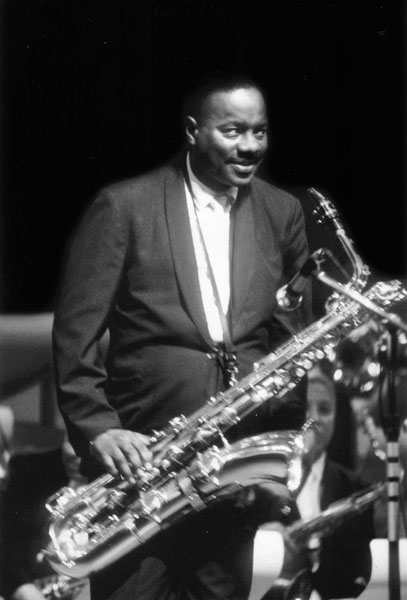Harry Carney: baritone saxophonist, clarinetist
Harry Carney: born April 1, 1910 in Boston; died Oct. 8, 1974 in New York City
- Carney played piano, clarinet and alto sax before gravitating toward the baritone while still in his teens.
- He began playing professionally at 15 with Boston bands led by Bobby Sawyer, Walter Johnson, Tasker Crosson and Joseph Steele.
- Duke Ellington gained the permission of Carney’s parents to take him on the road when he was only 16.
- Carney mastered the technique of circular breathing, but it was his amazingly big sound and musicality that gave Carney his international reputation on the baritone saxophone.
- Carney was voted best baritone saxophonist by the readers of Down Beat magazine seven times, and by the readers of Metronome magazine four times. He also won the Down Beat critics poll twelve times.
- In his 46 years with Duke—the longest tenure among all of Duke’s men—Carney also co-wrote “Rockin’ in Rhythm,” an Ellington staple, and served as Ellington’s designated driver on road trips.
- His death followed that of Ellington by only five months.

Harry Carney (Photo by Brent Banulis)
Ernie Santosuosso on Harry Carney
No instrumentalist represents the brilliant continuum of the Ellington legacy more effectively than Harry Carney, the giant of the baritone saxophone.
Recruited out of Boston English High School when he was only 16, Harry anchored Duke’s reed section with his bearish tone, expanding the horizons of the baritone sax as a powerfully relevant force in jazz.
As a newly-arrived teenager, I “discovered” Ellington when he headlined at the Metropolitan Theater, long since renamed the Wang Center—and there was Harry. As a collegian in 1941, I paid heed to George Frazer’s writings lavishing praise on Ellington et al.—and there was Harry.As a newly-arrived teenager, I “discovered” Ellington when he headlined at the Metropolitan Theater, long since renamed the Wang Center—and there was Harry. As a collegian in 1941, I paid heed to George Frazer’s writings lavishing praise on Ellington et al.—and there was Harry.
Nothing could deter me from enjoying the band’s visits to New England. On the day I was drafted into the Army, I celebrated that evening in company with the Ellington band at the RKO Boston—and Harry Carney, who was to eventually hold down the distinguished baritone chair through six decades—was still there. To me, he will always be a royal member of Duke’s family.
